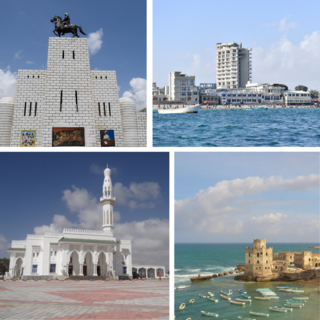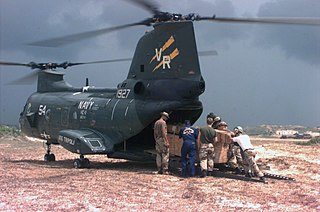
Somalia, officially the Federal Republic of Somalia, is a country in the Horn of Africa. The country is bordered by Ethiopia to the west, Djibouti to the northwest, the Gulf of Aden to the north, the Indian Ocean to the east, and Kenya to the southwest. Somalia has the longest coastline on Africa's mainland. Its terrain consists mainly of plateaus, plains, and highlands. Hot conditions prevail year-round, with periodic monsoon winds and irregular rainfall. Somalia has an estimated population of around 17.1 million, of which over 2 million live in the capital and largest city Mogadishu, and has been described as Africa's most culturally homogeneous country. Around 85% of its residents are ethnic Somalis, who have historically inhabited the country's north. Ethnic minorities are largely concentrated in the south. The official languages of Somalia are Somali and Arabic. Most people in the country are Muslims, the majority of them Sunni.

The University for Peace (UPEACE) is an international university and intergovernmental organization established as a treaty organisation by the United Nations General Assembly in 1980. The university offers postgraduate, doctoral, and executive programmes related to the study of peace and conflict, environment and development, and international law.

Mogadishu, locally known as Xamar or Hamar, is the capital and most populous city of Somalia. The city has served as an important port connecting traders across the Indian Ocean for millennia, and has an estimated urban population of 2,610,483. Mogadishu is located in the coastal Banadir region on the Indian Ocean, which unlike other Somali regions, is considered a municipality rather than a maamul goboleed.
Operation Blessing International Relief and Development Corporation (OBI) is a non-profit humanitarian organization headquartered in Virginia Beach, Virginia, United States. Founded in 1978, OBI has worked in 90 countries worldwide and within the U.S., implementing disaster relief, medical aid, clean water, hunger relief, community development and orphan care programs.

Puntland, officially the Puntland State of Somalia, is a Federal Member State in northeastern Somalia. The capital city is the city of Garoowe in the Nugal region, and its leaders declared the territory an autonomous state in 1998. Geographically to the west, Puntland lays claim to the intra-46th meridian territories that were outside European colonial rule during parts of the Scramble for Africa period.

Galkayo is the third-largest city in Somalia which serves as the capital of the north-central Mudug region. The city is divided into two administrative areas separated by a loose boundary.

Dadaab is a semi-arid town in Garissa County, Kenya. It is the site of a UNHCR base hosting 302,805 registered refugees and asylum seekers in three camps as of 31 October 2023, making it one of the largest in the world behind Kutupalong refugee camp. The centre is run by the United Nations High Commissioner for Refugees, and its operations are financed by foreign donors. In 2013, UNHCR, the governments of Kenya and Somalia signed a tripartite agreement facilitating the repatriation of Somali refugees at the complex.

The Somali Civil War is an ongoing civil war that is taking place in Somalia. It grew out of resistance to the military junta which was led by Siad Barre during the 1980s. From 1988 to 1990, the Somali Armed Forces began engaging in combat against various armed rebel groups, including the Somali Salvation Democratic Front in the northeast, the Somali National Movement in the northwest, and the United Somali Congress in the south. The clan-based armed opposition groups overthrew the Barre government in 1991.

Sister Cities International (SCI) is a nonprofit citizen diplomacy network that creates and strengthens partnerships between communities in the United States and in other countries, particularly through the establishment of "sister cities" which are broad and long-term agreements formally recognized by civic leaders. A total of 1,800 cities, states, and counties have partnered in 138 countries worldwide.

The Unified Task Force (UNITAF) was a United States-led, United Nations-sanctioned multinational force which operated in Somalia from 5 December 1992 until 4 May 1993. A United States initiative, UNITAF was charged with carrying out United Nations Security Council Resolution 794 to create a protected environment for conducting humanitarian operations in the southern half of the country.

Danish Refugee Council (DRC) is a private Danish humanitarian nonprofit organization, founded in 1956. It serves as an umbrella organization for 33 member organizations.
A mine clearance organization, or demining organization, is an organization involved in the removal of landmines and unexploded ordnance (UXO) for military, humanitarian, or commercial reasons. Demining includes mine clearance, as well as surveying, mapping and marking of hazardous areas.
The Somali National Front (SNF) was a politico-military organization that operated in southern Somalia during the Somali Civil War and represented one of the major factions involved in the conflict.

The United States Africa Command is one of the eleven unified combatant commands of the United States Department of Defense, headquartered at Kelley Barracks, Stuttgart, Germany. It is responsible for U.S. military operations, including fighting regional conflicts and maintaining military relations with 53 African nations. Its area of responsibility covers all of Africa except Egypt, which is within the area of responsibility of the United States Central Command. U.S. AFRICOM headquarters operating budget was $276 million in fiscal year 2012.
Somali Canadians are Canadians of Somali origin or are dual Somali and Canadian nationality.

Bardera Polytechnic is a non-profit tertiary polytechnic education centre located in Bardera, Somalia. The college's full name is Bardera Polytechnic College (BPC). Bardera Polytechnic is the first post-secondary institution in Bardera and the larger Gedo region. Bardera Polytechnic is the first post civil war vocational training school in southern Somalia.
SEHO is a non-profit non-governmental organization operating in southern Somalia. It also has offices in the United States and Canada.

The Istituto Italiano di Cultura, the Italian Cultural Institute in English, is a worldwide non-profit organization created by the Italian government. It promotes Italian culture and is involved in the teaching of the Italian language. The creation of the institute was in response to the desire for a deeper understanding of Italian culture throughout many continents. By organising cultural activities it supports the work carried out by the Italian Embassies and Consulates. There are 85 Italian Cultural Institutes throughout major cities around the world.

East Africa University (EAU) is a non-for-profit institution university in the autonomous Puntland state in northeastern Somalia, as well as in neighbouring Somaliland. Founded in the commercial capital of Bosaso, it has additional branches in Buhodle, Galdogob, Galkayo, Garowe, Qardho and Erigavo. The college offers courses in seven core departments including: Medicine, engineering, veterinary, Business Admin, Sharia studies, It also operates distance learning center.

Somaliland and the United States do not have official diplomatic relations. While Somaliland operates a representative liaison office in Washington, D.C., it does not have formal diplomatic status under the provisions of the Vienna Convention on Diplomatic Relations. Both countries do maintain contact as delegations from both sides have met in the past.















